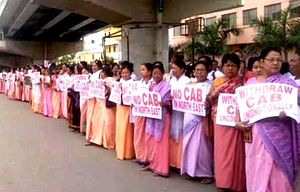In a replay of the violent protests early this year, India’s northeast has erupted again in protests against the ruling Bharatiya Janata Party government’s plan to to grant citizenship to a section of non-Muslim migrants and refugees from the neighboring countries.
Protests have swept Nagaland, Meghalaya, Manipur, and Arunachal Pradesh while civil society organizations in Assam and Mizoram have decided to launch a fresh protest against the BJP’s decision to reintroduce the Citizenship (Amendment) Bill in Parliament to amend the Citizenship Act of 1955.
If passed in Parliament, the bill will grant citizenship to non-Muslim refugees and migrants from Pakistan, Afghanistan, and Bangladesh, such as Hindus, Buddhists, Parsis, Sikhs, and Christians, who came to India before December 31, 2014. It also reduces the mandatory requirement of 11 years in the country to six years to obtain citizenship by naturalization.
Indian Home Minister Amit Shah had recently announced in Kolkata that the Citizenship (Amendment) Bill would be reintroduced in Parliament to amend the Citizenship Act 1955, which came close on the heels of similar statements by other BJP leaders.
However, the northeastern states have also been assured by BJP leaders that the proposed bill would not change the constitutional safeguards enshrined in Article 371 of the Constitution or the Inner Line Permit mechanism which requires a person travelling from the mainland to secure permission to travel to some of these states.
The controversial bill was introduced in Parliament in 2016, but was soon referred to a Joint Parliamentary Committee for suggestions following protests from other parties. The Committee had held discussions with various civil society groups in the northeast, most of whom had made a case to keep the frontier region out of the ambit of the bill. But the BJP decided to pass the bill early this year and it could be passed only in the lower house of Parliament. The BJP had reiterated its resolve to pass the bill in the manifesto ahead of the general elections held in May.
Ethnic communities in the northeast are apprehensive that new citizenship laws would encourage Hindus and other non-Muslim communities from Bangladesh to migrate to the region which will threaten their cultures and identities. Most of these states have witnessed protests either against foreign nationals or the influx of people from the rest of the country.
Manipur and Meghalaya have demanded the implementation of the Inner Line Permit regime for the past several years. Nagaland has already embarked on an exercise to identify indigenous citizens in the state, while Mizoram has expressed concern over the influx of Chakma migrants from the neighboring Chittagong Hill Tracts of Bangladesh. In Arunachal Pradesh, the issue of citizenship to the Chakma and Hajong refugees who migrated to the hill state in the early sixties is still hanging, following opposition from a large number of local groups.
Among all the northeastern states, the most vociferous protests were organized in Assam last January since the proposed amendment to the Citizenship Act of 1955 nullifies the National Register of Citizens (NRC), which was published last August. The register has drawn up a list of citizens and has excluded close to two million people who would now have to approach the Foreigners’ Tribunals and higher courts to challenge the decision by the NRC Secretariat.
It is quite likely that there are more Bangladeshi Hindus than Muslims among the delisted people from the NRC in Assam which prompted the state BJP president Ranjit Das to make a case in favor of the Citizenship (Amendment) Bill a few days ago. Bangladeshi Hindus form a large chunk of the vote bank of the BJP, which explains why the party is keen to pass the bill in Parliament.
More importantly, the BJP has emerged as a serious contender in the assembly polls in Bengal scheduled to be held in 2021. The party won a whopping 18 seats out of a total of 42 in the state in the recently held general elections, which belied the estimates of most poll pundits. The party believes that passage of the Citizenship (Amendment) Bill in Parliament will further brighten its chances of defeating the ruling All India Trinamool Congress in the forthcoming elections.
Rajeev Bhattacharyya is a senior journalist in Guwahati, Assam.

































